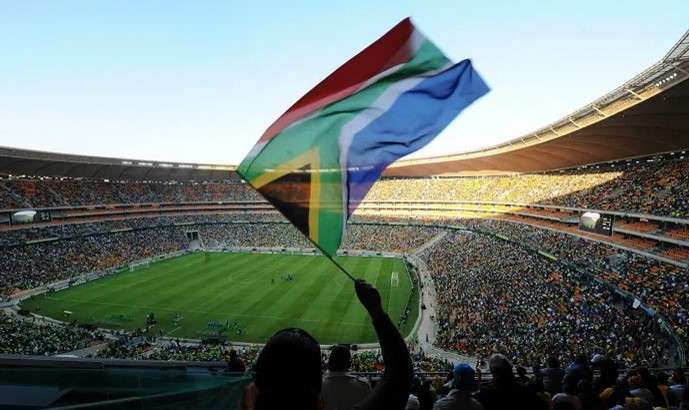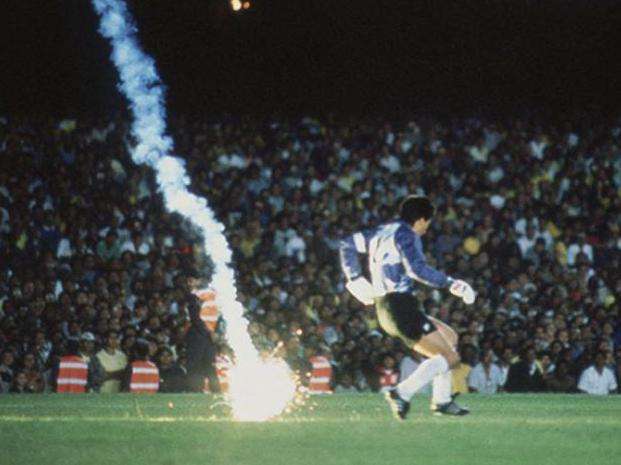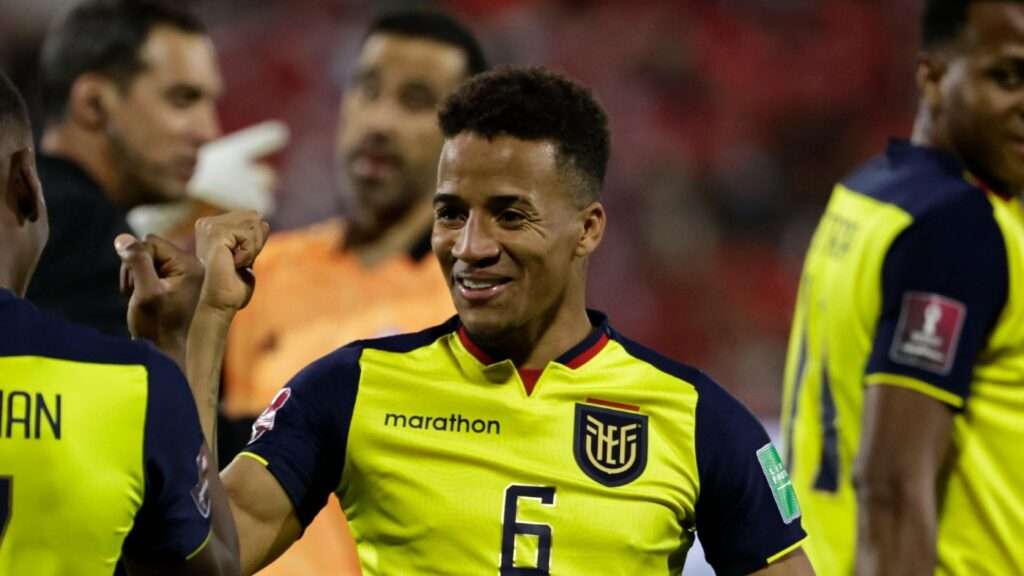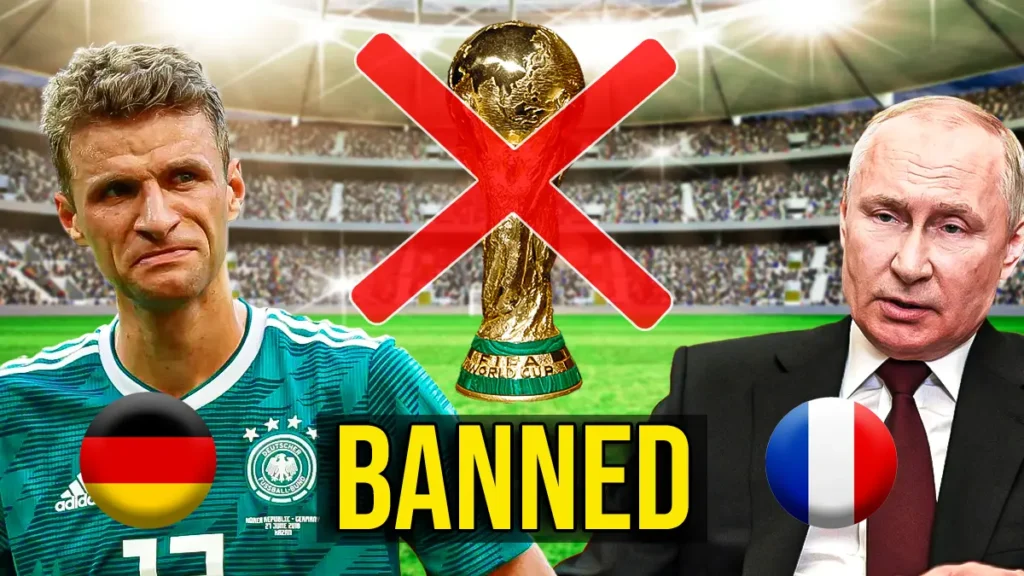Countries once banned from World Cup: Playing in the FIFA World Cup is a dream every nation holds, but only a few are able to attain it.
While the majority of countries miss out on World Cup tournaments due to failing to qualify, a few are unable to feature simply because they have been banned.
Countries Once banned from World Cup
In nearly every World Cup tournament since 1950, at least one country has been barred from participating for various reasons. In this video, we’ll explore some of those countries and the reasons behind their bans. Here are seven countries that have been banned from competing in the World Cup.
1. Germany and Japan, 1950

Read Also – 10 Most Toxic Footballers Right Now
The Second World War took place between 1939 and 1945, resulting in the cancellation of two World Cup tournaments. When the competition resumed in 1950, FIFA chose to penalize the primary nations involved in that war by prohibiting both Germany and Japan from participating in the tournament.
In light of this decision, it is indeed surprising that FIFA allowed Italy, also one of the Axis powers, to participate in the 1950 tournament. However, the intricacies of FIFA’s decision-making remain unclear.
2. South Africa, 1961–1992
South Africa was banned from entering the World Cup for more than three decades, primarily due to apartheid. Racism was widespread in the country during that time.

Reportedly, their local leagues were segregated by race, with white clubs being perceived and treated as superior to black ones. Consequently, in 1961, FIFA banned and expelled them from the football community.
They were reinstated in 1963, but the country’s leadership demonstrated a lack of progress by intending to send an all-white team to England in ’66 and an all-black team to Mexico in ’70, ensuring that both races did not mix. As a result, FIFA did not allow their participation in those tournaments and subsequently reinstated the ban.
Shop Jerseys Here – Goal90.shop
The ban persisted until 1992, a period when South Africa was approaching independence. All political prisoners had been released, and negotiations among political parties were underway. FIFA lifted the ban, enabling their participation in the World Cup qualifiers for the ’94 tournament, although they were defeated by Nigeria.
However, in 1998, South Africa managed to qualify and made their inaugural appearance at a FIFA World Cup tournament. Twelve years later, they hosted the tournament, and as of now, that marks the last time they have qualified for the World Cup.
3. Mexico, 1990
Mexico has hosted the FIFA World Cup twice and is scheduled to host it again in four years. However, following their last hosting in 1986, they committed a significant offense that led to a two-year ban.

They were found guilty of fielding over-aged players in the qualifying games for the 1988 Olympics. Consequently, FIFA imposed a two-year ban, resulting in their absence from Italia ‘90. However, they made a comeback in time for USA ‘94 and have successfully qualified for every World Cup tournament since then.
4. Chile, 1994

Chile hosted the World Cup in 1962 and secured a third-place finish on their home soil. However, 32 years later, they faced disqualification from the competition due to the actions of Roberto Rojas.
Rojas, the goalkeeper for the Chilean team at the time, was preparing for the 1990 World Cup. During a crucial qualifying game against Brazil in 1989, with Chile needing a win to advance, they found themselves trailing by a goal. A distressing incident occurred approximately 20 minutes before the match concluded at the Maracana Stadium when a flare was thrown onto the pitch. Rojas fell, purportedly struck by the firework, resulting in a bloody head injury.
Subsequently, Rojas was carried off the pitch on a stretcher, and his teammates left the field, citing unsafe playing conditions. As investigations unfolded, video evidence contradicted the apparent impact of the flare on Rojas. It was revealed that the fireworks never actually touched the goalkeeper.
Further scrutiny uncovered that Rojas had self-inflicted the bloody injury using a razor concealed in his glove. Instead of replaying the match, FIFA awarded Brazil a 2-0 victory, which consequently led to Chile’s disqualification from the 1990 World Cup.
The repercussions extended beyond the disqualification. Chile was then banned for one tournament, resulting in their absence from the 1994 edition in the US. Rojas faced a lifelong ban, as did the team doctor and coach involved in the scandal.
5. Myanmar (2006)
Myanmar, previously known as Burma, is an Asian nation that has not qualified for the World Cup since gaining independence from the United Kingdom. However, this did not prevent FIFA from imposing a ban on them.

In 2002, they were slated to participate in a World Cup qualifying match in Iran but decided to withdraw. Consequently, FIFA imposed a £20,000 fine and banned Myanmar from competing in the 2006 World Cup held in Germany. Notably, this was the third instance of the country withdrawing from qualification, leading to FIFA’s strict action.
Since the imposition of that fine and ban, Myanmar has consistently participated in qualifiers without further withdrawals. Despite their ongoing efforts, they have yet to secure qualification for the World Cup tournament itself. Nevertheless, it’s evident that these bans have had an impact, compelling Myanmar to participate in the qualifiers without pulling out.
6. Russia, 2022

This particular incident is indeed widely recognized. After the invasion of Ukraine, Russia faced extensive isolation from much of the international community, and the world of football felt the substantial effects.
A Russian club owner was essentially compelled to leave the UK, while Russian football clubs were promptly expelled from European competitions. Additionally, the location for the Champions League final, originally planned to be held in Russia, was relocated. Notably, all Russian national teams were suspended by FIFA.
Russia, having already advanced to the playoffs and being merely two games away from securing their participation in their third consecutive World Cup, were effectively removed.
7. Ecuador, 2022

At present, this situation has not been formally confirmed, but it is being included here because there’s a strong possibility it could occur. Ecuador, having already secured qualification for the 2022 World Cup in Qatar, might face a ban from participating.
The controversy revolves around a defender named Byron Castillo, whose actual age remains uncertain. In 2017, Castillo faced suspension from the Ecuadorian national team due to allegations of falsifying his birth documents.
Following investigations in April 2021, Castillo’s Ecuadorian nationality was verified, permitting him to represent the country. However, the following month, Chile complained to FIFA, asserting that Castillo was born in Colombia in July 1995, contradicting the documentation stating his birth in Ecuador in November 1998.
After approximately a month’s scrutiny, FIFA dismissed Chile’s complaint in June, affirming Ecuador’s position in the World Cup.









